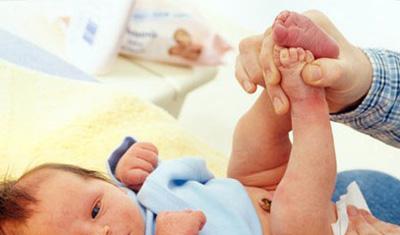Mothers should pay attention to the importance of keeping warm and maintaining a stable child's temperature so that the baby is not affected by the outside environment.
Dinking mother milk
After birth, babies should breastfeed as soon as possible to take advantage of colostrum and stimulate mothers to release more milk. Note to breastfeed the baby in the right position: the baby's head and body are in line, the baby's belly is close to the mother's womb, the baby's nose is opposite the mother's breast, the mother's hand lifts the baby's head, shoulders and butt, and the baby's mouth is attached to the mother's nipple. Usually infants breastfeed 8-12 times a day; when the baby is 3 months old, it drops to 6-8 times a day. After the suckle is finished, the baby should burp a little to lie down. Breastfeeding should be continuous in the first 6 months of life.
Keep warm
Mothers should pay attention to the importance of keeping warm and maintaining a stable baby's temperature. Make sure your baby's room is warm, free from wind, wear warm enough clothes, cover the blanket, wear a hat, arm / foot socks, change diapers when wet, regularly monitor your baby's temperature 4 times per hour. how to touch the baby's hands and feet. In addition, the baby needs to sunbathe every morning before 9:00 am to help children get more vitamin D, reduce sweating and absorb calcium well.
Navel care
Newborn umbilical cord can easily cause infection if not cared for properly. Every day need to clean the baby's navel with saline water (when bathing your baby to avoid getting wet). After cleaning, apply a sterile gauze pad and then wrap it with an elastic bandage (avoid the bandage too tight), always make sure the baby's navel is always dry, well ventilated so that the umbilical cord falls off quickly. Should take your baby to the doctor when you notice abnormalities such as swelling of the baby's navel, discharge of pus.
Cleaning every day

Bathing children: bathing, washing babies daily with warm water (choose shampoo, shower gel for children only). When bathing, pay attention to cleaning the body parts: neck folds, armpits, legs, back of neck, groin folds, genitals, anus. After bathing, dry the baby with a clean towel, apply straw, get dressed, drop eyes, nose, wipe baby's ears and brush the body with oil.
Changing diapers: every time your baby pee and pee, pay attention to gentle hygiene with warm water, dry with a soft cloth and change diapers for your baby. Take care not to wrap the diaper too tightly, which will cause skin irritation.
Eye, nose, and ear hygiene: wipe eyes, nose with a soft cloth or saline swab. After cleaning, drop your eyes and nose with normal saline. Clean your baby's ears by gently wiping the baby's ears and ears with a small cotton swab.
Nails: regularly wipe baby's hands, cut nails when they see them grow out to avoid scratching their own skin (note cut just right, not too long or too short)
Keep the place of the baby clean, regularly wipe it clean. Baby tools such as bottles, cups, spoons ... need to be washed thoroughly, boiled before use to ensure hygiene. Clothes, socks, feet, towels ... must be washed and dried.
Sleep
Getting enough sleep is essential for your baby's health. From birth to 3 months, babies usually sleep 16-20 hours a day, day and night. A long sleep can last 4-5 hours. If your baby sleeps too far, pay attention to add more milk when he wakes up to breastfeed. When babies sleep often startled, put a thin blanket, put the edge of the blanket on the two sides of the mattress; Always remember to put your baby to sleep in a supine position to help him sleep better and reduce the risk of sudden death in babies.












